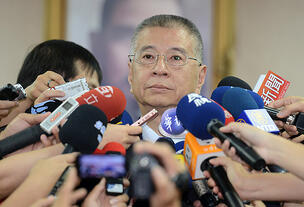 In Taiwan this week, Defense Minister Andrew Yang resigned from his post after allegations of plagiarism began to surface.
In Taiwan this week, Defense Minister Andrew Yang resigned from his post after allegations of plagiarism began to surface.
According to reports, an article published under Yang’s name in 2007 contained plagiarized material. However, according to Yang, the article was written by a friend who agreed to be a ghostwriter for the piece.
Yang apologized for the scandal and admitted that the work had issues saying, “This is my personal mistake and I apologize for it.”
But while Yang’s story appears to be an all-too-familiar tale of a politician caught in an act of past plagiarism and resigning to avoid a larger scandal, what makes Yang’s case unique is that he was in the post less than a week.
Yang turned in his resignation just six days after taking the job. His appointment to the position came after his predecessor, Kao Hua-chu, was forced to resign over a scandal involving the death of an army conscript, which sparked a massive protest in the Taiwanese capital of Taipei.
It also comes at a time when Taiwan's President, Ma Ying-jeou is facing a great deal of political adversity, with a poll in January showing his approval rating at just 13%.
Clearly, Taiwan is facing some very significant and potent political challenges. It’s likely, if not probable, that Yang’s quick resignation had more to do with the political climate than the allegations of plagiarism.
To be clear, Yang’s challenge of attempting to restore confidence and faith in a military rocked by a national scandal, was difficult before he took office. However, allegations of plagiarism most likely made his task impossible, leaving resignation as his only practical option.
The other interesting element in Yang’s case is that he admits not necessarily to the plagiarism itself, but rather, to using a ghostwriter. Yang’s claims that the plagiarism was done by a friend who wrote the article for him adds an extra layer to the case.
Though there are many times politicians and government officials use ghostwriters without any issue, the article in question dealt with the People’s Liberation Army in mainland China, an issue that’s directly related to Yang’s work in the Defense Ministry.
While we might not expect a President to write his autobiography or a Senator to write every speech they give, using a ghostwriter in a paper at the core of one’s area of expertise raises questions about his or her standing in the field.
Even worse, for the paper to be so poorly vetted that it contained plagiarized passages, which likely could have been detected easily, harms Yang’s image even further.
Though Yang’s resignation was the best thing he could have done under the circumstances, his quick departure causes even more chaos is a Defense Ministry that is already facing unprecedented challenges.
For other politicians however, Yang’s case is a stark reminder of the dangers of using ghostwriters and the importance of vetting any work that will be released under your name. Whether it’s a speech, a book or an article, it’s important to know that anything bearing your name is worthy of it.
Photo from bloomberg.com
Related
Topics: Current Events